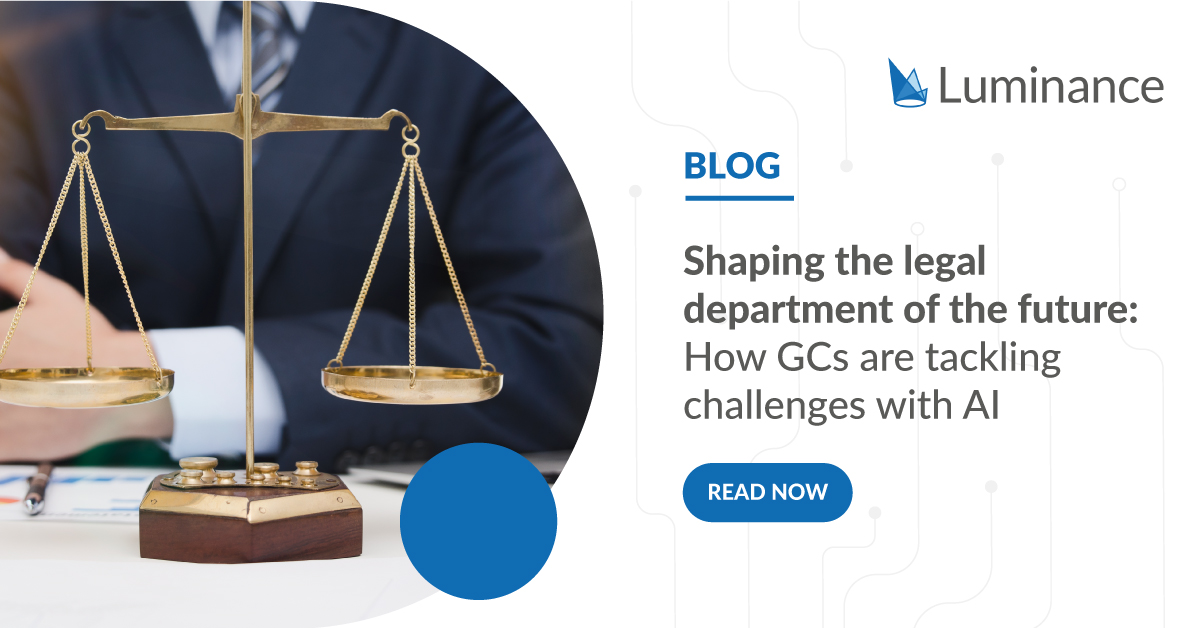
Blog
How GCs are tackling challenges with AI
10 December 2020 | Clementine Fox, Head of Account Management
The role and responsibilities of General Counsels have evolved considerably over the past few decades. Central to this is that General Counsels, or GCs, are not just technical specialists that are only to be consulted when there is a specific legal issue. Instead, GCs are expected to play a significant and proactive role in wider legal matters, including ensuring compliance, examining potential business risk and being key members of the corporate decision-making team. In this blog, I explore how GCs are using AI technology like Luminance to address challenges, new and old, in turn allowing them to keep legal work in-house, drive efficiency and propel the continual growth of their businesses.
1. Budget cuts
Corporate legal budgets have always been under a microscope, but we’ve seen this year that COVID-19 and the subsequent economic recession has meant that scrutiny has only increased around the finances allocated to many in-house teams. In fact, a recent survey conducted by Exterro found that in-house lawyers are “most worried about” economic pressures. Luminance’s machine learning technology saves in-house teams from manually trawling through huge numbers of incoming and outgoing contracts, saving time, cost and reducing reliance on outsourcing to third parties.
2. The litigation boom
The economic fallout around the pandemic has given rise to a substantial number of putative class action lawsuits alleging price gouging, improper product labelling, failure to warn, breach of data security, health care, and much more. In order to prepare for this growing wave of litigation and to proactively scope out the legitimacy of claims, law firms and in-house legal departments are turning to Luminance’s eDiscovery software to gain rapid insight into their datasets, allowing them to respond as quickly and robustly as possible when faced with impending legal action.
3. Complex regulations and increasing globalisation
A recent report by the Looking Glass found that 80% of GCs find the regulatory landscape more complex than it was just two to three years ago. Indeed, new laws on finance, trading, the environment, fraud and data privacy presents large challenges in ensuring compliance with regulatory requirements across all regions in which a company does business. On top of that, failure to comply can result in hefty financial penalties. For instance, failure to comply with the General Data Protection Regulation (GDPR) can result in fines of up to 4% of a company’s annual global turnover, or 20 million euros (whichever is greater).
Regulation can come in other forms, too: take the example of Covid-19 and new safety protocols about bringing employees back to work or conditions relating to reductions in workforce or compensation- these will vary significantly both regionally within countries and on a country-by-country basis. As such, understanding these variations can be the difference between smooth sailing and a class action lawsuit. Luminance is able to analyse documents in any language and pertaining to any jurisdiction. Using Luminance’s Automatic Document and Clause Compliance technology, in-house counsel can select a model against which all other documentation is compared, for instance a Spanish labour law policy about going back to work. By forming a conceptual understanding of documents, Luminance is then able to highlight to the reviewer where there are discrepancies in terms of the language of existing documentation. A GC can then use this insight to amend existing company policies in light of this, ensuring utmost compliance with new provisions.
4. Supply chain disruption
Covid-19 has caused significant supply chain disruption for a wide variety of businesses and with a ‘hard’ Brexit on the horizon, it has never been so important for companies to review their contracts and understand their contractual obligations, mitigating any risk accordingly. Luminance’s flexible machine learning tool is able to immediately analyse documents, tagging key information such as contract type, dates, parties, governing law and key termination and payment clauses, without the need for prior machine training.
Not only that, by adopting a flexible machine learning approach, Luminance is able to learn from the interactions of the reviewer to generate additional insight. This proved invaluable for Dentons Spain who recently used the platform to conduct a Covid-19-focused review and were able to find a crucial yet unexpected force majeure clause which in turn nullified an agreement.
GCs and in-house legal teams today
In today’s complex and fast-moving legal and business environment, GCs must be ready to act when faced with new and existing challenges. By embracing Luminance’s AI technology, GCs are able to drive additional value and efficiency in their business, allowing them to proactively assess and understand risk and pivot when faced with events such as Brexit or Covid-19.